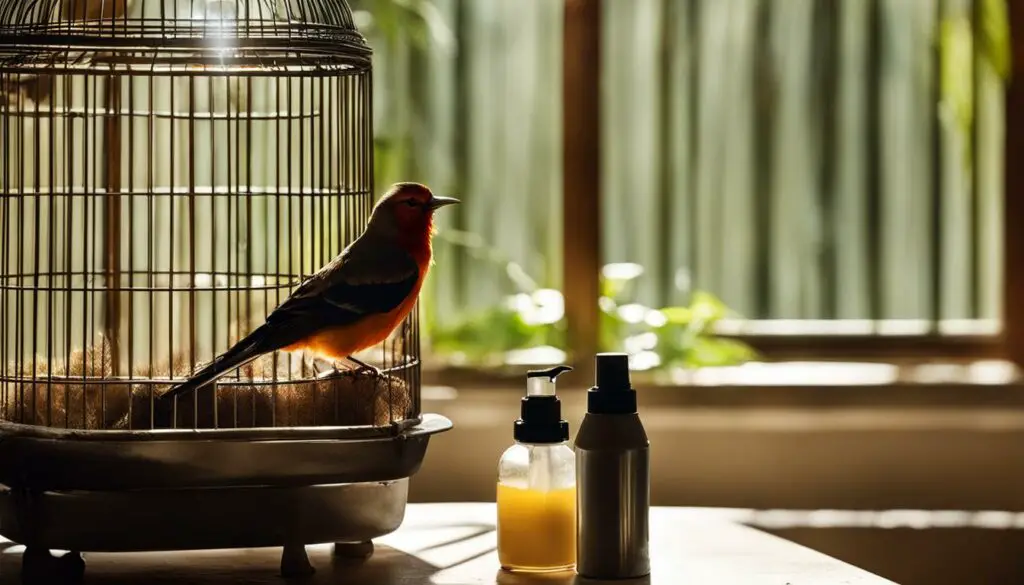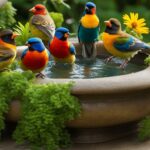Cleaning your bird’s cage is essential for their health and well-being. Regular cleaning helps prevent the buildup of bacteria and fungal infections that can harm your bird. Follow these easy and effective tips to keep your feathered friend’s cage clean and healthy.
Key Takeaways:
- Regular cleaning of your bird’s cage is crucial for their overall health and well-being.
- Choose safe and pet-friendly cleaning supplies to avoid toxic exposure.
- Implement daily cleaning tasks such as changing the cage liner and cleaning food and water dishes.
- Set aside time each week for more thorough cleaning, including washing the tray and cleaning accessories.
- Monthly deep cleaning of the entire cage helps maintain a clean and safe environment.
The Importance of Cleaning a Bird Cage
Regularly cleaning your bird’s cage is crucial for their overall health and well-being. Dirty cages can lead to serious health problems and attract pests. Cleaning the cage regularly helps prevent bacterial and fungal infections, odors, and pest infestations. It also helps maintain a clean and safe environment for both your bird and your family.
Proper bird cage maintenance is essential in creating a healthy living space for your feathered friend. A consistent bird cage cleaning routine not only ensures the comfort and well-being of your bird but also contributes to a harmonious living environment for both of you. By following best practices for bird cage cleaning, you can effectively minimize the risk of disease, maintain hygiene, and provide your bird with a safe and clean living space.
“Regularly cleaning your bird’s cage is crucial for their overall health and well-being.”
When it comes to bird cage cleaning, it’s important to establish a routine that works best for you and your bird. This routine should include daily, weekly, and monthly cleaning tasks. By following a consistent schedule, you can ensure that your bird’s cage remains clean and in optimum condition. Remember, a clean cage is not only beneficial for your bird’s health, but it also helps create a comfortable and pleasant living environment for both of you.
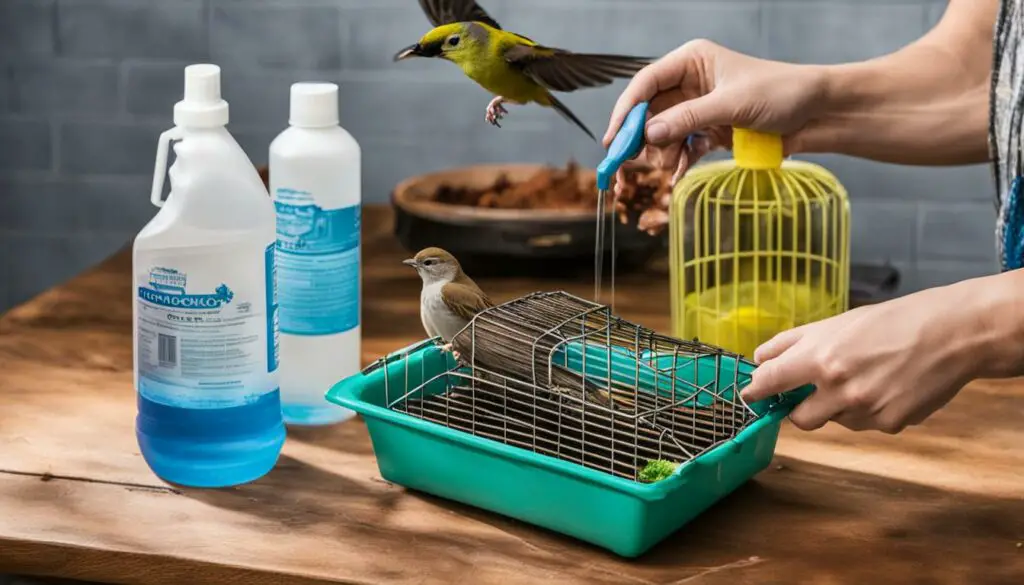
| Cleaning Frequency | Tasks |
|---|---|
| Daily | Change the cage liner, clean food and water dishes, spot clean surfaces |
| Weekly | Wash cage trays, scrub grates, clean and rotate toys and perches |
| Monthly | Deep clean the entire cage, remove and clean accessories |
By following these bird cage cleaning tips and implementing a regular cleaning routine, you can ensure a clean and healthy environment for your pet bird. Remember to choose safe cleaning supplies, avoid toxic chemicals, and thoroughly rinse off all cleaning products. With proper maintenance and care, your bird’s cage will provide them with a comfortable and safe home for years to come.
Choosing the Right Cleaning Supplies for Bird Cage Cleaning
When it comes to cleaning your bird’s cage, it’s important to select the right cleaning supplies to ensure the safety and well-being of your feathered friend. Harsh chemicals like bleach or ammonia can be toxic to birds, so it’s best to avoid them. Instead, opt for mild, unscented dish detergent or pet-friendly disinfectants. Natural cleaning solutions like vinegar or baking soda can also be safe and effective options.
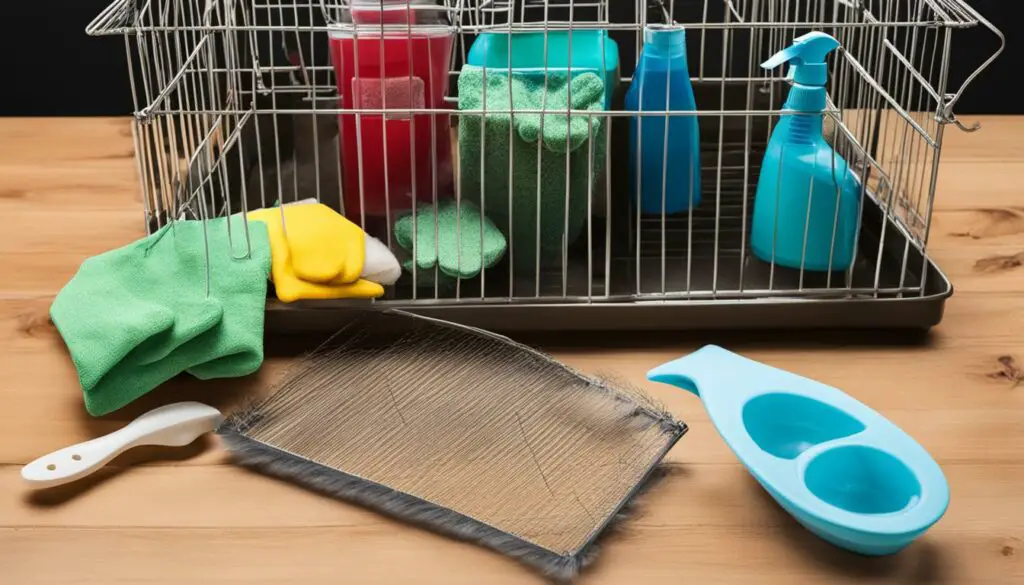
When choosing cleaning products, look for those specifically labeled as safe for bird cages. These products are designed to be non-toxic and gentle on birds’ sensitive respiratory systems. It’s important to thoroughly rinse off all cleaning products to ensure no residue is left behind that could be harmful to your bird.
To help you choose the right cleaning supplies, here is a table summarizing some safe and effective options:
| Cleaning Supplies | Effectiveness | Safety |
|---|---|---|
| Mild, unscented dish detergent | Effective at removing dirt and grime | Safe for birds when thoroughly rinsed off |
| Pet-friendly disinfectants | Kills germs and bacteria | Non-toxic for birds when used as directed |
| Vinegar | Natural disinfectant | Safe for birds in small quantities, but should be rinsed thoroughly |
| Baking soda | Effective at removing odors | Safe for birds when used in moderation |
Remember, always read the labels of cleaning products and consult with your veterinarian if you’re unsure about the safety of a particular product. By choosing the right cleaning supplies, you can ensure a clean and safe environment for your bird.
Daily Bird Cage Cleaning Tasks
To maintain a clean and healthy bird cage, there are several daily cleaning tasks that should be completed. These tasks help prevent the buildup of bacteria and keep your bird’s environment fresh and comfortable. Here are some tips for daily bird cage cleaning:
1. Change the Cage Liner
Every day, remove the old cage liner and replace it with a fresh one. This helps prevent the accumulation of bird droppings and keeps the cage clean and odor-free. Choose a liner that is easy to clean and dispose of, such as newspaper or liner papers specifically designed for bird cages.
2. Clean Food and Water Dishes
Regularly clean and sanitize your bird’s food and water dishes. Use mild dish detergent and hot water to remove any food debris or residue. Rinse thoroughly to ensure no soap remains. Clean dishes help prevent bacterial growth and ensure your bird has access to clean food and water.
3. Spot Clean Surfaces
Take a damp cloth or paper towel and spot clean any surfaces that may have been soiled by your bird. This includes perches, toys, and cage bars. Remove any droppings or debris to maintain a clean and hygienic environment for your bird.
4. Remove Waste
Regularly remove any waste or debris that may have accumulated in the cage. This includes droppings, feathers, or leftover food. Dispose of the waste properly to prevent any odors or potential health hazards for your bird.
5. Maintain Fresh Bedding
Bedding material, such as newspaper or cage liner, should be replaced regularly to keep the cage clean and fresh. Check the bedding daily and remove any soiled or wet areas. Providing clean and dry bedding helps maintain a comfortable environment for your bird.
By following these daily cleaning tasks, you can ensure a clean and healthy living space for your bird. Regular cleaning helps prevent the buildup of bacteria and keeps your feathered friend happy and comfortable.
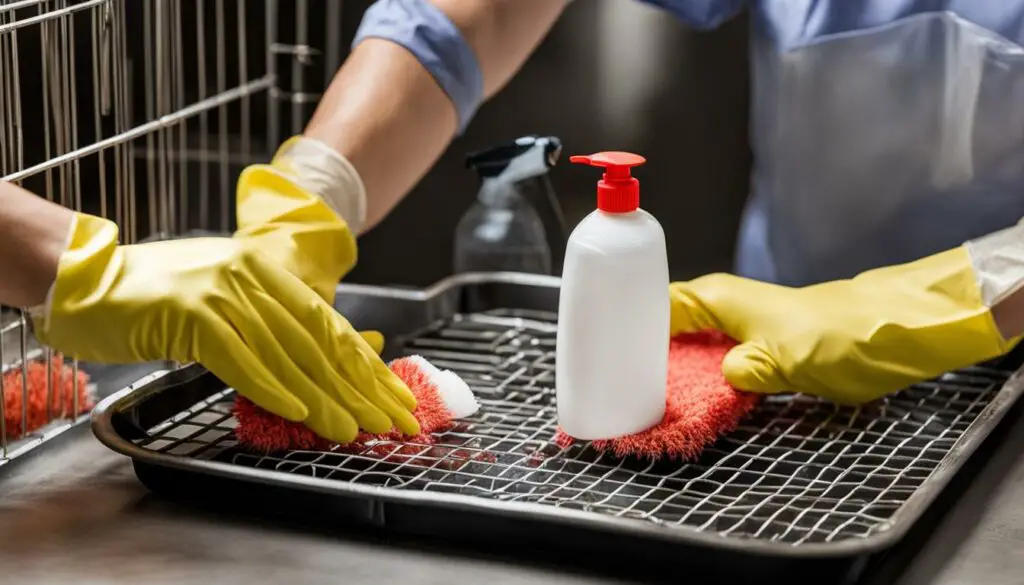
Weekly Bird Cage Cleaning Tasks
Keeping your bird’s cage clean on a weekly basis is crucial for their health and well-being. In addition to the daily cleaning tasks, there are specific weekly tasks that should be completed to maintain a clean and comfortable environment for your feathered friend.
Table: Weekly Bird Cage Cleaning Tasks
| Task | Description |
|---|---|
| Wash the cage tray and grate | Remove the tray and grate from the cage and wash them thoroughly with mild soap and water. Scrub off any dried droppings and rinse them well before drying. |
| Clean and change perches | Remove and clean the perches in the cage. Inspect them for any signs of wear or damage and replace them if necessary. |
| Rotate and clean toys | Take out the toys from the cage and clean them with mild soap and water. Rotate the toys to provide variety and stimulation for your bird. |
By following these weekly bird cage cleaning tasks, you can ensure that your bird’s cage remains hygienic and free from any potential health hazards. Regularly washing the cage tray and grate, cleaning and changing perches, and rotating and cleaning toys will help maintain a fresh and stimulating environment for your bird.
Bird Cage Deep Cleaning: Best Practices for a Sparkling Clean Cage
When it comes to maintaining a clean and healthy environment for your feathered friend, regular cleaning is key. While daily and weekly cleaning tasks help keep the cage tidy, a monthly deep cleaning is essential to ensure optimal hygiene. A thorough deep cleaning removes accumulated dirt, bacteria, and germs, ensuring a sparkling clean cage for your bird to enjoy.
To start the deep cleaning process, remove all accessories, perches, dishes, and toys from the cage. These items should be washed separately in warm soapy water and thoroughly rinsed to remove any soap residue. While the accessories are drying, focus on cleaning the cage itself.
Deep cleaning your bird’s cage prevents the buildup of harmful bacteria and germs, providing a clean and safe environment for your feathered friend. It’s an important part of maintaining their overall health and well-being.
| Step | Procedure |
|---|---|
| 1 | Using a sturdy scrub brush, scrub the bars and base of the cage with a bird-safe cage cleaner. Pay close attention to cracks and corners where germs can accumulate. |
| 2 | Rinse the cage thoroughly with clean water to remove any residue from the cleaning solution. |
| 3 | Dry the cage completely before returning your bird’s accessories and perches. |
By following these best practices for monthly deep cleaning, you can ensure that your bird’s cage remains clean, germ-free, and a safe haven for your beloved pet. Remember to always prioritize your bird’s health and well-being by choosing bird-safe cleaning products and providing a comfortable and stimulating environment.
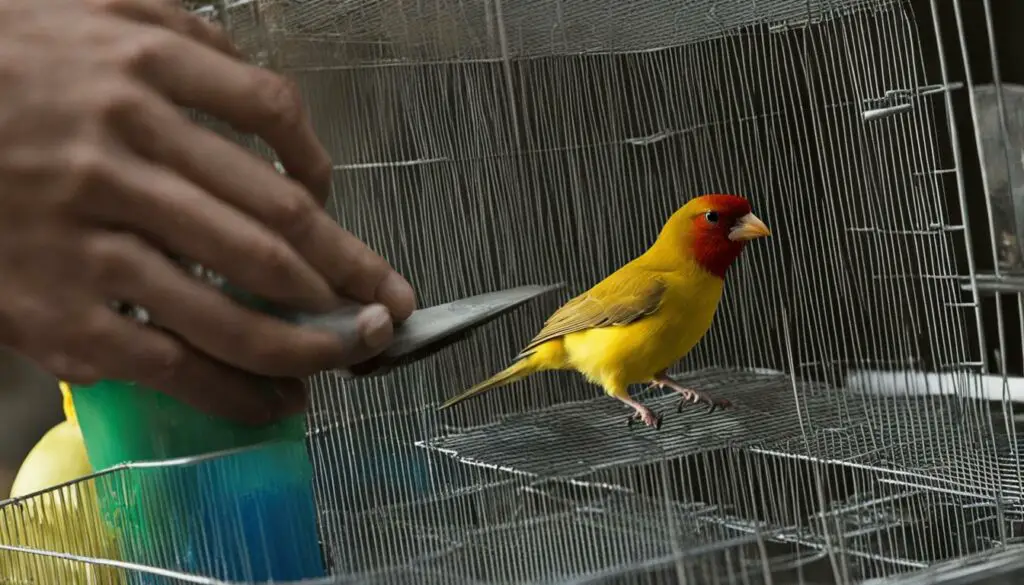
How to Choose a Safe Soap for Bird Cage Cleaning
When it comes to cleaning your bird’s cage, selecting a safe soap is crucial. Harsh chemicals like bleach or ammonia can be toxic to birds and should be avoided. Instead, opt for a mild and unscented dishwashing liquid. This type of soap is gentle on the cage surfaces while effectively removing dirt and debris. Remember to thoroughly rinse off the soap to ensure there are no residues that could harm your bird.
Additionally, natural cleaning solutions like vinegar or baking soda can be safe and effective alternatives. These household items have powerful cleaning properties and are pet-friendly. However, it’s important to use them in moderation and follow the recommended dilution ratios to prevent any potential irritation to your bird.
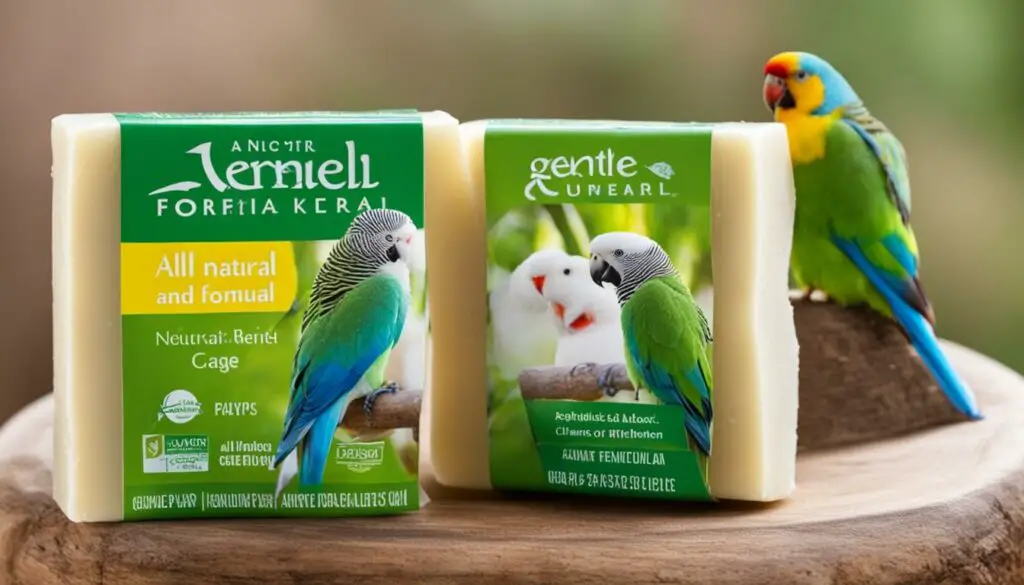
Another important aspect of cage cleaning is maintaining fresh bedding. Regularly replacing the bedding material not only helps in keeping the cage clean but also prevents the buildup of bacteria and parasites. Choose bedding that is safe for birds, such as paper-based or natural fiber options. Avoid cedar or pine shavings, as their strong aroma can be harmful to your bird’s respiratory system.
By using a safe soap and keeping the bedding fresh, you can ensure a clean and healthy environment for your bird. Regular cleaning and maintenance are essential for your bird’s well-being and can contribute to their overall health and happiness.
Toxic Cleaners to Avoid When Cleaning Bird Cages
When it comes to cleaning your bird’s cage, it’s important to be aware of the potential dangers of certain cleaning products. Some cleaners can be toxic to birds and should be avoided to ensure the health and safety of your feathered friend. Here are some cleaners that you should steer clear of when cleaning your bird’s cage:
- Bleach: Bleach is a strong chemical that can cause skin and respiratory irritation in birds. It’s best to avoid using bleach or any products containing bleach when cleaning your bird’s cage.
- Aerosol sprays: Aerosol sprays, such as air fresheners or cleaning sprays, can release harmful fumes that can be harmful to your bird’s respiratory system. Avoid using these types of sprays in the vicinity of your bird’s cage.
- Chemical cleaners: Chemical cleaners, especially those with strong fragrances, can be hazardous to birds. The fumes from these cleaners can irritate your bird’s respiratory system and cause health issues. Opt for pet-friendly or eco-friendly cleaners instead.
It’s always important to read product labels carefully and choose cleaning products that are safe for use around birds. If you’re unsure about the safety of a certain cleaner or product, consult with your veterinarian for guidance. Your bird’s health and well-being should always be a top priority when cleaning their cage.
“When it comes to cleaning your bird’s cage, it’s better to be safe than sorry. Avoid using toxic cleaners that can harm your bird’s health and opt for pet-friendly alternatives instead.”
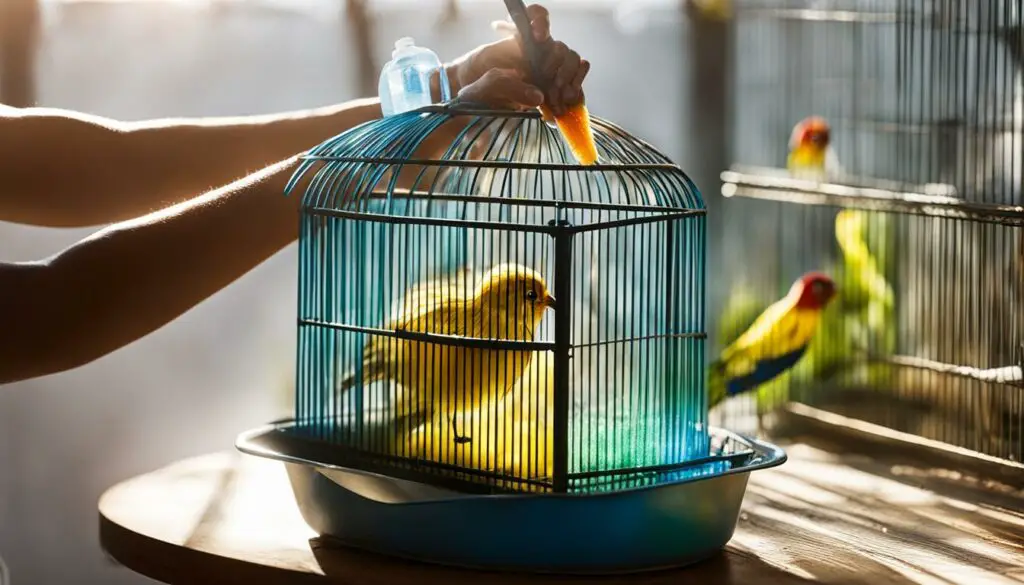
Tips for Bird Cage Cleaning Precautions
While it’s important to avoid toxic cleaners, there are also some general precautions you should take when cleaning your bird’s cage to ensure their safety:
- Wear disposable gloves to protect your hands from potentially harmful cleaning products and bird waste.
- Provide a safe and comfortable space for your bird to rest or roam while you clean their cage.
- Remove toys, perches, and accessories from the cage before cleaning and thoroughly clean and dry them before placing them back in the cage.
By following these cleaning precautions, you can help create a clean and safe environment for your bird, minimizing the risk of exposure to harmful substances and ensuring their overall well-being.
Cleaning Tips for Powder Down Birds
If you have a powder down bird, such as a parrot or a cockatoo, it’s important to follow specific cleaning tips to maintain a clean and healthy environment for your feathered friend. Powder down birds produce a fine, powdery substance from their feathers that can accumulate in the cage and surrounding areas. Here are some cleaning tips specifically tailored for powder down birds:
1. Change Furnace Filters Regularly
Powder down birds release a fine dust that can spread throughout your home, including your HVAC system. It’s essential to change your furnace filters regularly to prevent the buildup of bird dust in the air and maintain good air quality for both you and your bird.
2. Blow Bird Dust Out of Smoke Detectors
Smoke detectors can collect bird dust, which can interfere with their functionality. To ensure they work properly, use a can of compressed air or a hairdryer on a cool setting to blow out any accumulated dust from the smoke detectors in your home.
3. Wipe Down Walls Behind the Cage
When caring for a powder down bird, it’s important to regularly wipe down the walls behind the bird’s cage. The fine powder can settle on the walls and accumulate over time. Use a damp cloth or sponge to gently wipe away any dust or residue.
4. Vacuum Around the Edges of the Cage
Regular vacuuming is essential to remove any loose feathers or debris around your bird’s cage. Pay special attention to vacuuming around the edges, where the powdery dust may accumulate. Use a vacuum with a HEPA filter to ensure efficient filtration of fine particles.
5. Use Bird-Safe Pest Control Products
Powder down birds can be more susceptible to mites and other pests. Use bird-safe pest control products as needed to prevent infestations and maintain a clean and pest-free environment for your bird. Consult with your avian veterinarian for recommendations on safe pest control options.
By following these cleaning tips, you can ensure a clean and comfortable environment for your powder down bird. Regular cleaning and maintenance will help prevent the buildup of dust and maintain the overall health and well-being of your feathered companion.
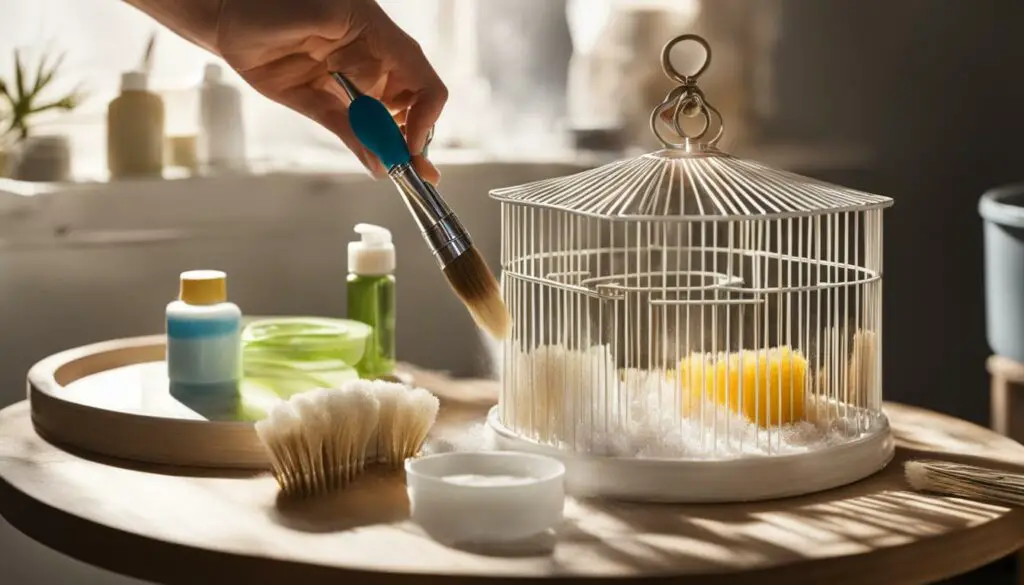
Safety Precautions When Cleaning Bird Cages
When it comes to cleaning your bird’s cage, it’s important to prioritize safety for both you and your feathered friend. Here are some essential safety precautions to keep in mind:
1. Wear Disposable Gloves
Before you start cleaning, put on a pair of disposable gloves to protect your hands from direct contact with waste and potentially harmful cleaning products. This will help prevent the spread of bacteria and keep you safe during the cleaning process.
2. Provide a Safe Space for Your Bird
While you clean the cage, it’s important to have a safe space for your bird to rest or roam. Set up a separate area where your bird can stay temporarily, ensuring it is secure and free from any potential hazards. This will prevent your bird from ingesting cleaning products or getting injured while you clean.
3. Remove Accessories and Clean Separately
Prior to cleaning the cage, remove all toys, perches, and accessories. Clean them separately using bird-safe disinfectants, mild soaps, or vinegar. Ensure that they are thoroughly rinsed and dried before placing them back in the cage. This helps maintain a clean and stimulating environment for your bird.
4. Thoroughly Rinse off Cleaning Products
After you have cleaned the cage and its accessories, make sure to thoroughly rinse off all cleaning products. Leaving any residue behind can be harmful to your bird’s health. Rinse with clean water until all soap or disinfectant is completely removed, and allow the cage to air dry before returning your bird.
By following these safety precautions, you can ensure a safe and effective cleaning process for your bird’s cage, promoting a clean and healthy environment for your feathered friend.
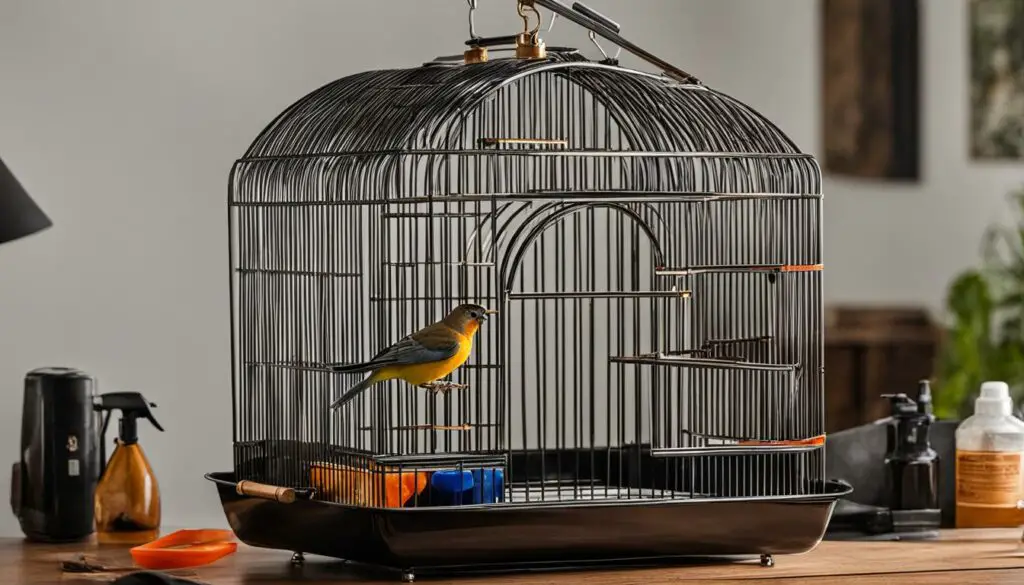
Dusting and Disinfecting the Bird Cage
Dusting and disinfecting the bird cage are crucial steps in maintaining a clean and hygienic environment for your feathered friend. Regular cleaning helps prevent the accumulation of bacteria and keeps your bird’s cage fresh and comfortable. Here are some important tips for dusting and disinfecting your bird’s cage:
- Remove any dust, bird feces, or debris: Start by carefully removing any visible dust, bird droppings, or debris from the cage’s surfaces. Use a soft cloth or brush to gently wipe or brush off the loose particles.
- Use a pet-friendly disinfectant: After dusting, it’s important to disinfect the cage to kill any lingering germs. Choose a pet-friendly disinfectant that is safe for birds. Follow the instructions on the disinfectant product and apply it to the cage according to the recommended usage. Pay special attention to high-touch areas like perches and food/water dishes.
- Rinse off the disinfectant: Once the disinfectant has been applied, thoroughly rinse off the cage with clean water. This step is important as residual disinfectant can be harmful to your bird. Make sure to rinse off all surfaces, including bars, perches, and accessories.
- Allow the cage to air dry: After rinsing, allow the cage to air dry completely before returning your bird to their clean and disinfected environment. This will help prevent any potential harm from residual moisture and ensure a dry and comfortable cage for your bird.
Regularly dusting and disinfecting your bird’s cage helps maintain a clean and healthy living space, minimizing the risk of bacterial and fungal infections. It’s important to establish a cleaning routine and follow these steps to ensure the well-being of your feathered friend.
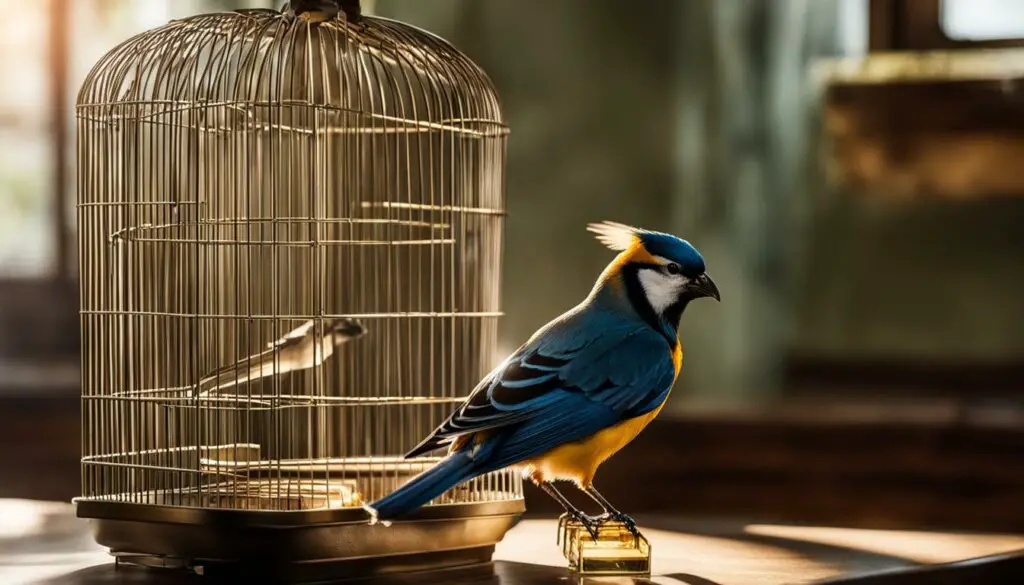
Table: Recommended Schedule for Dusting and Disinfecting
| Task | Frequency |
|---|---|
| Dusting the cage surfaces | Every other day |
| Disinfecting the cage | Once a week |
| Rinsing off the disinfectant | After every application |
| Air drying the cage | After every cleaning |
This recommended schedule provides a general guideline for dusting and disinfecting your bird’s cage. However, it’s important to adapt the frequency based on the specific needs of your bird, cage size, and environmental factors.
Wiping Off the Cage Frame
When it comes to cleaning your bird’s cage, don’t forget to give some attention to the cage frame. The cage frame is prone to accumulating dry debris like feces and old food, which can create an unsightly and potentially unhygienic environment for your feathered friend. Keeping the cage frame clean is crucial for maintaining a clean and safe living space for your bird.
To clean the cage frame, start by using a soft cloth or brush dampened with water. Gently wipe off the frame, paying close attention to corners and cracks where dirt can hide. If the frame is made of a material that allows, you can also use a mild soap or pet-friendly disinfectant to thoroughly clean it. Rinse off any soap or disinfectant residue and dry the frame completely before reintroducing your bird to their cage.
Regularly wiping off the cage frame helps prevent the buildup of debris, making the cage more visually appealing and promoting a healthier environment for your bird.”
Remember to incorporate cleaning the cage frame into your regular bird cage cleaning routine. By giving the frame some extra attention, you can ensure that all parts of the cage are clean and well-maintained. A clean cage frame not only enhances the overall appearance of the cage, but it also contributes to the health and well-being of your bird.
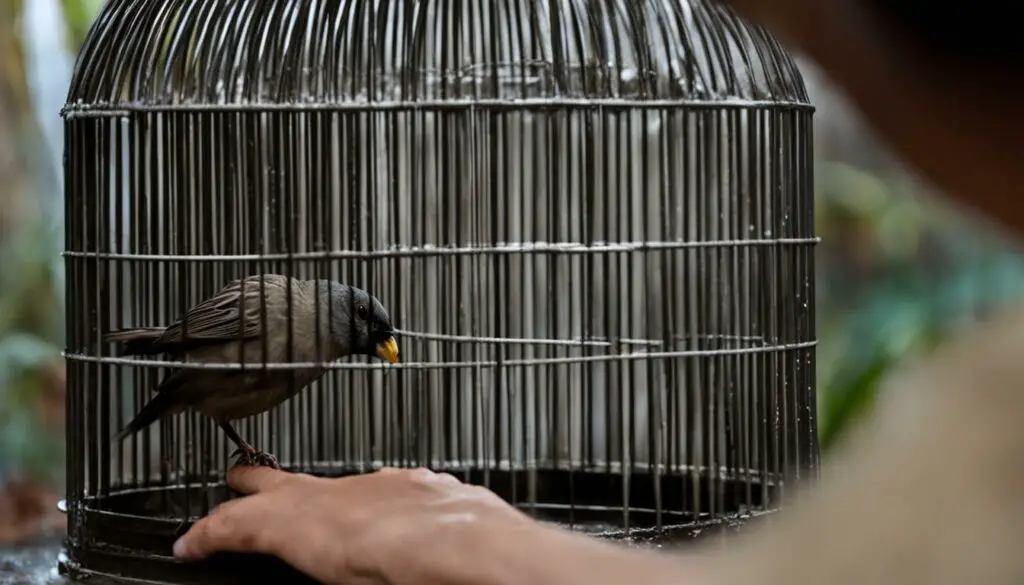
Summary:
Regularly wiping off the cage frame is an important part of keeping your bird’s cage clean and hygienic. By removing dry debris and dirt from the frame, you can create a more visually appealing environment and promote your bird’s health and well-being. Incorporate cage frame cleaning into your regular maintenance routine to ensure that all parts of the cage are clean and fresh.
Taking Care of the Trays
When it comes to cleaning your bird’s cage, one important area to pay attention to is the trays. These trays collect waste and debris, so regular cleaning is necessary to maintain a clean and hygienic environment for your feathered friend.
If your bird cage has pull-out trays, it’s easy to clean them by removing them from the cage and washing them with water and a soft cloth. Be sure to remove any soiled bedding material and discard it properly. Thoroughly rinse the trays to remove any remaining waste or residue.
It’s also important to monitor the consistency of your bird’s droppings while cleaning the trays. Abnormal droppings can indicate potential health issues, so it’s essential to keep an eye on this. Additionally, regularly disinfecting the trays will help prevent the growth of harmful bacteria and keep your bird healthy.
| Step | Description |
|---|---|
| 1 | Remove the pull-out trays from the bird cage. |
| 2 | Wash the trays with water and a mild, unscented dish detergent. |
| 3 | Rinse the trays thoroughly to ensure all cleaning products are removed. |
| 4 | Inspect the consistency of your bird’s droppings and monitor for any changes. |
| 5 | Regularly disinfect the trays to prevent the growth of bacteria. |
By paying attention to the trays and incorporating regular cleaning and disinfection into your bird cage maintenance routine, you can help ensure a clean and healthy environment for your bird.
Cleaning Cage Accessories
When it comes to maintaining a clean and healthy environment for your bird, it’s important not to overlook the cleaning of their cage accessories. Cleaning and maintaining accessories such as toys, perches, and feeding devices are essential for ensuring your bird’s safety and well-being.
One of the first steps in cleaning cage accessories is to remove any droppings or debris that may have accumulated on them. Use a soft cloth or brush and hot water to gently scrub the surfaces of toys and perches. Rinse them thoroughly to remove any soap residue. For feeding devices, disassemble them and wash each part individually, ensuring that all food remnants are removed.
It’s also important to regularly inspect and replace any damaged or worn-out accessories. Birds can be curious creatures, and they may chew or damage their toys or perches over time. By periodically checking the condition of these items, you can ensure that they remain safe and enjoyable for your bird to use.
I always make sure to rotate my bird’s toys regularly to provide them with new and stimulating experiences. This not only keeps them entertained but also gives me the opportunity to clean and sanitize the toys they’ve been playing with. It’s a win-win for both of us!
Table: Recommended Cleaning Frequency for Bird Cage Accessories
| Accessory | Cleaning Frequency |
|---|---|
| Toys | At least once a week |
| Perches | At least once a week |
| Feeding devices | After every use |
By following a regular cleaning routine and maintaining clean accessories, you can provide a safe and stimulating environment for your bird. Remember to always use safe and pet-friendly cleaning products, rinse thoroughly, and ensure that all accessories are dry before returning them to the cage. Your feathered friend will appreciate the clean and fresh surroundings!
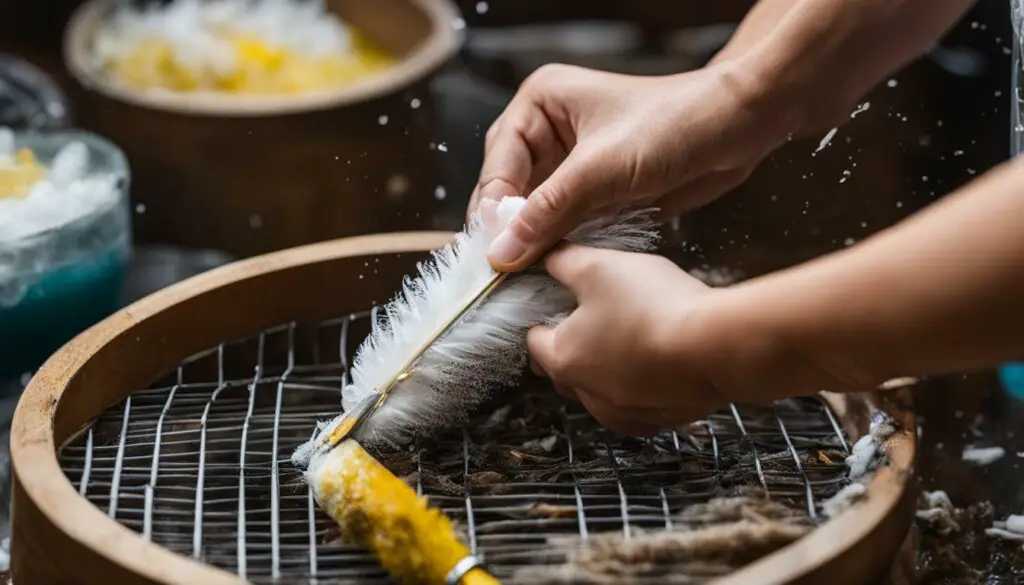
Safe Cage Cleaning Practices
When it comes to cleaning your bird’s cage, it’s important to prioritize their safety. Here are some best practices to ensure a safe and effective cleaning routine:
- Choose pet-friendly cleaning products: Avoid using harsh chemicals like bleach or ammonia, as they can be toxic to birds. Instead, opt for mild, unscented dishwashing liquid or pet-friendly disinfectants. Natural alternatives like vinegar or baking soda can also be safe and effective options.
- Wear disposable gloves: To protect your hands from waste and cleaning products, it’s recommended to wear disposable gloves while cleaning the bird cage. This helps prevent direct contact with potentially harmful substances and keeps your hands clean.
- Provide a safe space for your bird: When cleaning the bird cage, make sure to have a designated safe area where your bird can rest or roam. This can be a separate cage, playpen, or an enclosed space where your bird will be secure and away from any cleaning hazards.
- Remove and clean accessories: Before cleaning the cage, remove and clean all accessories such as toys, perches, and dishes. Wash them thoroughly with mild soap and water, rinse well, and allow them to air dry completely before returning them to the cage. This helps prevent the spread of bacteria and maintains a clean and stimulating environment for your bird.
“Regular cleaning and maintenance of your bird’s cage are essential for their health and well-being. Follow these safe cage cleaning practices to ensure a clean and comfortable environment for your feathered friend.”
By following these safe cage cleaning practices, you can maintain a clean and healthy living space for your bird. Regular cleaning helps prevent the buildup of bacteria, fungi, and pests, ensuring your bird’s well-being. Remember to thoroughly rinse off all cleaning products, dry the cage completely, and provide fresh bedding before returning your bird to their clean and safe home.
| Safe Cage Cleaning Practices | Benefits |
|---|---|
| Choose pet-friendly cleaning products | Protects your bird from exposure to toxic chemicals |
| Wear disposable gloves | Keeps your hands clean and minimizes direct contact with waste and cleaning products |
| Provide a safe space for your bird | Ensures your bird’s safety and prevents accidents during cage cleaning |
| Remove and clean accessories | Maintains a clean and stimulating environment for your bird |
Remember: Your bird’s health and safety should always be the top priority when cleaning their cage. By implementing these safe cage cleaning practices, you can create a clean and comfortable living space for your feathered friend.
Conclusion
In conclusion, regular cleaning and maintenance of your bird’s cage are crucial for their health and well-being. By following these easy and effective bird cage cleaning tips, you can provide a clean and comfortable environment for your feathered friend.
Remember the importance of daily cleaning tasks, such as changing the cage liner, cleaning food and water dishes, and spot cleaning surfaces. Additionally, set aside time each week for more thorough cleaning, including washing the cage’s tray and rotating toys.
When choosing cleaning supplies, opt for mild, unscented dishwashing liquid or pet-friendly disinfectants. Avoid harsh chemicals like bleach or ammonia, as they can be toxic to birds. Always rinse off cleaning products thoroughly, and ensure the cage is completely dry before returning your bird.
By establishing a regular cleaning routine and using safe products, you can maintain a fresh, tidy, and germ-free bird cage, promoting the health and well-being of your feathered companion.
FAQ
Why is it important to clean my bird’s cage regularly?
Regular cleaning is essential for your bird’s health and well-being. It helps prevent bacterial and fungal infections, odors, and pest infestations.
What cleaning supplies should I use for my bird’s cage?
Avoid harsh chemicals and opt for mild, unscented dish detergent or pet-friendly disinfectants. Natural cleaning solutions like vinegar or baking soda can also be safe and effective options.
What are the daily cleaning tasks for a bird cage?
Daily tasks include changing the cage liner, cleaning food and water dishes, and spot cleaning surfaces with a damp cloth or paper towel.
What should be done weekly to maintain a clean bird cage?
Weekly tasks include washing the cage’s tray, scrubbing the grate, cleaning and changing perches, and rotating toys.
How often should I do a deep cleaning of the bird cage?
It is recommended to do a deep cleaning of the entire bird cage once a month. This includes removing all accessories, washing the cage thoroughly, and scrubbing the bars and base.
What soap should I use for cleaning my bird’s cage?
Use mild, unscented dishwashing liquid or other bird-safe cleaning products. Rinse off the soap completely and dry the cage before placing your bird back in.
Are there any toxic cleaners I should avoid when cleaning the bird cage?
Yes, avoid using bleach, ammonia, aerosol sprays, chemical cleaners, and scented products. These can be toxic to birds and can cause skin and respiratory irritation.
How do I clean a bird cage for powder down birds?
For powder down birds like parrots and cockatoos, additional cleaning tasks include changing furnace filters, blowing bird dust out of smoke detectors, and wiping down walls behind the cage.
What safety precautions should I take when cleaning my bird’s cage?
Wear disposable gloves, provide a safe space for your bird while you clean, remove and clean accessories before cleaning the cage, and ensure thorough rinsing of all cleaning products.
How do I dust and disinfect the bird cage?
Remove dust, bird feces, and debris from the cage’s surfaces and use a pet-friendly disinfectant. Rinse off the disinfectant thoroughly and allow the cage to air dry.
How do I wipe off the cage frame?
Carefully wipe off the cage frame with water and a soft cloth or brush, paying attention to corners and cracks where dirt can hide.
How should I take care of the trays in the bird cage?
Clean pull-out trays by removing and washing them with water and a soft cloth. Replace soiled bedding material regularly, and disinfect the trays for your bird’s good health.
How do I clean cage accessories like toys and perches?
Use hot water and safe soap to clean toys, and rinse them thoroughly. Replace bedding material regularly and clean the surrounding areas of the cage, including the floor.
What are safe cage cleaning practices?
Choose safe and pet-friendly cleaning products, use disposable gloves, have a safe place for your bird while you clean, remove and clean accessories before cleaning the cage, and thoroughly rinse off all cleaning products.
Source Links
- https://birdsupplies.com/pages/how-to-clean-a-bird-cage
- https://www.thesprucepets.com/cleaning-your-birds-cage-390332
- https://beautyofbirds.com/birdcage-cleaning-tips/

